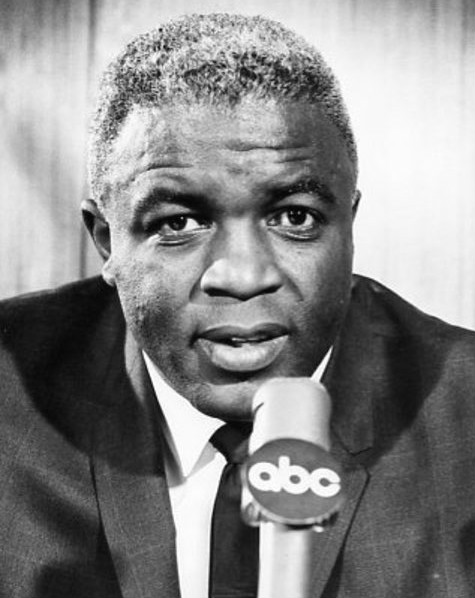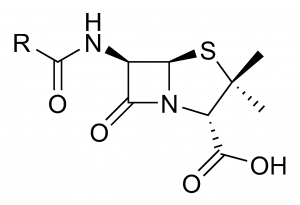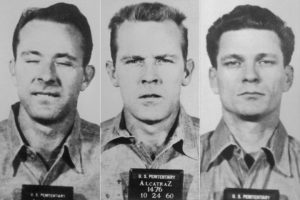After breaking down the race-wall in sports, Brooklyn Dodgers baseball player Jackie Robinson sought to create a more fulfilling role for himself in helping the African-American community. When he retired in 1957, Robinson took on a role as a businessman, and subsequently also as a player in the Civil Rights Movement of the 1950s and 1960s. Although he is better known for his athletic accomplishments, such as becoming the first African-American major league baseball player, winning Rookie of the Year in 1947, and leading the Brooklyn Dodgers to victory in the 1955 World Series, Robinson wanted to do even more than just be known for his baseball career.1 He felt like the best place to start was in the business world, where he hoped to promote the idea of “black capitalism.” The basic idea behind “black capitalism” was to increase the amount of African-American workers and business owners in Black communities, so that they might keep their wealth in their communities, thereby helping to build their communities’ wealth through reinvestment of that capital in their communities.2

Following Robinson’s retirement, William Black, the president of the coffee company Chock full o’Nuts, hired Robinson as one of three vice presidents of the company. Robinson brought a great deal of fame to the company name. As vice president, he was in charge of personnel, and he listened to the complaints of employees who worked at the company. But this was not his only job. Every three weeks, a column in Robinson’s name appeared in many of the newspapers in the suburbs of New York. He was able to accomplish this with the help of a young playwright named William Branch. Robinson’s articles primarily covered sports and topics of the day, such as the most recent of the lynchings in Mississippi, or even something simple like the actions of Steve Allen, a talk show host.3
One of his article’s caused one of the most controversial events to happen in Robinson’s life. A group of individuals from Glendale-Ridgewood, a section in Queens held a meeting to protest the overcrowding of nearby Brooklyn schools. It had been experiencing an increase in students, the majority of whom were African-Americans. This protest came about due to the insufficient schools in Glendale. Robinson responded to this incident in his column, calling the individuals from Glendale “bigots.” His response resulted in thirty people boycotting Chock full o’Nuts coffee and their restaurants. They argued that Robinson had written lies about them. Distressed by their response, Robinson felt responsible for causing the company to receive negative publicity and went to William Black for advice. Black then gave Robinson a statement to use for his next column. It read, “I cannot speak for all the stockholders of Chock full o’Nuts, because I now own only one-third of the company. Speaking for my third, if anyone wants to boycott Chock because I hired Jackie Robinson, I recommend Martinson’s coffee. It’s just as good. As for our restaurants, there are Nedick’s, Bickford’s, and Horn & Hardart in our price range. Try them. You may even like them better than ours.”4
Surprisingly, even though the company lost thirty customers, Chock full o-Nuts actually gained more customers because of this incident. A PTA president, from one of the overcrowded schools, sent a very heart warming letter to Black. The letter was filled with joy that Black decided to stand by Robinson’s side in this time of conflict. To show their gratitude, they explained how Brooklyn residents (a.k.a. “Brooklynites”) were going to clean the shelves of their coffee products and crowd every counter until the stores sold out of Chock full o-Nuts’ coffee.5

Robinson was also very active in the Civil Rights Movement of the early 1960s. In 1960, Martin Luther King Jr. was sent to jail in Albany, Georgia. That prompted Robinson to call presidential candidate Richard Nixon to intervene in the situation on behalf of King. However, Nixon refused to do or say anything. In 1962, determined to show his own support for the Civil Rights Movement, Robinson then marched with King in Birmingham, Alabama to protest against the harsh treatments of African-Americans in the state. Then, on June 12, 1963, the Mississippi NAACP leader Medgar Evers was gunned down by white supremacists. Three days after the shooting, Robinson sent a telegram to president John F. Kennedy asking for King’s protection while he attended the funeral for the fallen NAACP leader. The telegram raised an alarm, that if any harm were done to King, the consequences would cause mayhem, and conflict between the races would only rise. King was seen as a symbol of freedom. Robinson urged Kennedy to use everything at his disposal to ensure that King would be kept from harm.6
Despite his efforts at supporting the Civil Rights Movement, some activists did not agree with Robinson’s approach to civil rights. Robinson had a difficult time agreeing with the actions of the radical Black Muslim leader Malcolm X. Robinson’s support of the Civil Rights movement was questioned by Malcolm. Malcolm claimed that Robinson was a “house slave” who was bending the knee to his “White Bosses.”7 In a letter, Robinson informed Malcolm that violence against violence would only put more African-American youths in jail in their fight for freedom.8
Robinson did not stand for unreasonable violence, and tried to provide support for Self-Defense, a group within the Black Panther Party. Even after the assassination of Malcolm X, the group showed support for his practice, taking violent action when necessary. Robinson did his best to prove that the Black Panther Party was peaceful and fought for civil rights. But Robinson found himself in a bind, once the Brooklyn Criminal Court had a case dealing with ten Black Panther members, plus two white promoters, who had been charged with acts of violence against off-duty police officers and firefighters. In Robinson’s written statement, he expressed to the press how these Black Panther members were only trying to protect themselves against unnecessary violence. Their goals were no different than any other civil rights group, pushing for the protection of the African-American community. Robinson felt sympathetic for African-Americans that defended themselves against discriminatory violence, but could not agree with the “Black Power separatists.”9 In the late 60’s, the civil rights movement began to lose traction and branched off into a number of different directions. Even Robinson had grown distant from the movement. Robinson did not believe in the separation between races and could no longer agree with the direction the Black Panther Party was taking.10
During 1968, both King and Robert Kennedy were assassinated. Robinson became depressed. Deep down, he felt that their quest for equality had become even more difficult to achieve, now that such champions of equality had been silenced by assassins’ bullets. The Civil Rights Movement had a long way to go, and the accomplishment of King’s dream was incomplete. With the barriers Robinson struggled to break down while playing in the major leagues, it was not enough to change the rest of America. He had cut ties with the Republican party, due to the fact that he realized that the Republican party cared little for minorities. In 1969, Robinson refused to take part in an “old-timers game” held at Yankee Stadium. All Robinson wanted was to see more minority managers and executives in the sport, a dream that he believed the major leagues had fallen far short on.11
With no signs of positive change on the horizon, Robinson decided to take matters into his own hands, helping in a way he knew would make a difference. In the late 60’s, he created a construction company. He knew how poorly built Brooklyn housing was for the African-American community living there. They were slums falling apart, infested with roaches and rats. So, Robinson wanted to do something about it by renovating homes for African-Americans, creating affordable and comfortable dwellings. Robinson hired African-American workers to help further his belief in “black capitalism,” and this construction company was his vehicle for furthering that vision.12 And things seemed to be going well. Robinson was once again helping his community. However, everything changed in a single moment.
Robinson’s son, Jackie Jr. was arrested for the possession of heroin. He had developed an addiction due to his injury during the Vietnam war in 1968. Three years later, on July 17, 1971, while overcoming his addiction, Jackie Jr. died in a car crash. With the loss of his son and his own declining health, due to his fight with diabetes and hypertension, Robinson died of a heart attack a year later at the age of 53.13 Later, in 1997, the MLB retired the number of Robinson’s jersey, 42, forever. Throughout his baseball, business, and civil rights accomplishments, Jackie Robinson changed America in more ways than one. He fought the odds and became an inspiration to many African-Americans. To this day he is remembered as a hero and will continue to be one.14

- UXL Encyclopedia of U.S. History, 2009, s.v. “Robinson, Jackie,” by Sonia Benson, Daniel E. Brannen, Jr., and Rebecca Valentine. ↵
- Encyclopedia of African-American Culture and History, 2006, s.v. “Robinson, Jackie,” by Jules Tygiel. ↵
- Stanley Hyman, “The Other Jackie Robinson,” The New Leader 80, no. 7 (1997): 8-9. ↵
- Stanley Hyman, “The Other Jackie Robinson,” The New Leader 80, no. 7 (1997): 8-9. ↵
- Stanley Hyman, “The Other Jackie Robinson,” The New Leader 80, no. 7 (1997): 8-9. ↵
- Thomas W. Zeiler, Jackie Robinson and Race in America (New York: Bedford/St. Martin’s, 2013), 32. ↵
- Thomas W. Zeiler, Jackie Robinson and Race in America (New York: Bedford/St. Martin’s, 2013), 32. ↵
- Thomas W. Zeiler, Jackie Robinson and Race in America (New York: Bedford/St. Martin’s, 2013), 32. ↵
- Thomas W. Zeiler, Jackie Robinson and Race in America (New York: Bedford/St. Martin’s, 2013), 33. ↵
- Thomas W. Zeiler, Jackie Robinson and Race in America (New York: Bedford/St. Martin’s, 2013), 32-33. ↵
- Thomas W. Zeiler, Jackie Robinson and Race in America (New York: Bedford/St. Martin’s, 2013), 34. ↵
- Roger Kahn, “The Jackie Robinson I Remember,” The Journal of Blacks in Higher Education, no.14 (1996): 93. ↵
- Roger Kahn, “The Jackie Robinson I Remember,” The Journal of Blacks in Higher Education, no.14 (1996): 93. ↵
- St. James Encyclopedia of Popular Culture, 2013, s.v. “Robinson, Jackie (1919-1972),” by Victoria Price. ↵



52 comments
Cayden Garcia
Jackie Robinson is truly a man of change. The fact that he went through countless acts of racism, hatred, and bigotry and still followed his dream shows how much he wanted a social change. He knew the road would be tough but he still took it. His story is truly inspiring and will be told for many generations to come. Very good article.
Good Job!
Nicolas Llosa
It was interesting to see another side of Jackie Robinson, a side of him besides baseball. He is a role model since his story is really empowering, showing how well rounded and successful a person can be, but also how he fought against racism being the first African American baseball player. He not only fought for civil rights and against segregation, but was also successful in the business world. He truly was a hero inside and outside the baseball court and I think people should know him as more than just a baseball player because he was so much more than that.
Alexandria Garcia
I never knew that Jackie Robinson did so much within the business world. We all really know him as a world-class baseball player that defied the odds of segregation in baseball. I think this article shows how well rounded a black person had to be to survive in a white mans world. He excelled in sports as well as literature and business. HE very well paved the way for black to become apart of the capitalist system as more than blue collar workers-but as owners and entrepreneurs. Very interesting and well written article.
Reba Reyes
My favorite baseball team is the Dodgers and the fact that Jackie Robinson played for them is amazing. Jackie Robinson is such a role model to many people and is extremely brave in being the the first African American baseball player. The man is an absolute legend! He dominated in and out of the diamond. He fought for his rights and fought against segregation. I truly admire Jackie Robinson.
Angela Perez
When I hear the name Jackie Robinson my mind automatically thinks baseball legend, icon, and trailblazer. I had no idea how active he was outside of the league. His dedication to ensuring Martin Luther King was safe, to teaching Black Panther youth self-defense is inspiring. His name is not normally tied to those of Malcom X or JFK, it is enlightening to know that even after retirement, he had a significant impact on his community.
Kayla Sultemeier
I never knew of Jackie Robinson outside of Major League Baseball. I have a new sense of respect for him after reading about everything that he did off of the field as well. He was a very brave man to even participate in the professional baseball at the time, much less contribute in the fight to end black and white segregation. I think that because we did not grow up in this era, it is really difficult for us to place a timeline on how many significant people were all together at once. This article made me realize how small the world actually is, especially after learning that he was surrounded and participated in the platforms of Martin Luther King Jr. and Malcom X.
Maria Obregon
This article was very interesting as well as informational! Many know and remember Jackie Robinson because of his baseball career, and not because of this. That includes me. I had no idea he was somebody who was active in the civil rights movement, nor that he was someone who actively worked to help the African-American community. Though that is the case, it is so admirable that he did!
Donte Joseph
The story of Jackie Robinson is one that I love because of the courage that he displays throughout his life. But I only knew of his life during his baseball career, I had not known about what he had accomplished afterwards. The ability to use your power, money, and prestige to give back to the community that you are apart of is amazing. No one begged him and he certainly did not have to contribute if he did not want to, but he did, and that is what makes him and his story even greater.
Erin Vento
Wow this was a really interesting article! I’m not much of a baseball fan, so while I knew his name and what he was famous for, I didn’t know about his baseball achievements, let alone his life after baseball. It’s also really interesting to think of him in contact with people like Dr. Martin Luther King and Malcolm X; I feel like when we are taught about Jackie Robinson being the first black baseball player in MLB, it’s disconnected from the civil rights movement.
Victor Rodriguez
This is an amazing and inspiring story. I believe that Jackie Robinson was a true hero on and off the stadium. It is so incredible how he had the courage to fight against segregation during that era. I believe that it is during hard times when your real character shows. Jackie Robinson demonstrated his integrity as a player and a human being. Being the athletic star that he was, he used his influence to fight for what was right. In 1964, public facilities were opened to all races. Not only that, but as a baseball player, Jackie broke all the walls and racial obstacles that existed in the sport. Very motivational story.